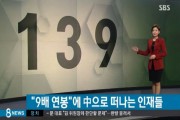A detailed criticism of the belief that Korean women are the victims of overwhelming discrimination has spread around the Korean internet. The author disputes the conclusion of the 2012 World Economic Forum Gender Gap Report, which ranks South Korea 108th in gender equality out of 135 surveyed countries. Notable critiques of the data include its omission of all Korean sex workers from employment figures, (the article claims there are 140-270,000 such workers), it’s lack of attention to the fact that women voluntarily leave the work force because they would rather enjoy hobbies and take care of children, and the rebuttal that men make better workers because they are driven to fulfill social expectations that they provide for their family.
While Ilbe users responded enthusiastically to the report’s allegations, there was also strong criticism against men for having double standards when it comes to discrimination, illustrated with ‘double standard scholar’ meme comics.
From Media Watch:
Sexual discrimination claims based on biased data
“In my next life, I would like to be male even if I am born as an insect.”
Minister of Gender Equality and Family, Cho Yun-seon, said this quote at an OECD forum in Paris, France last May. Cho said Korea is one of the most sexually unequal countries in the world according to the World Economic Forum’s Global Gender Gap report [WEF’s gender gap index ranked Korea at 108th among 135 surveyed countries in 2012] and Korea should try to improve its standings. Is sexual discrimination in Korea so severe that a minister representing Korea would make such an extreme remark quoting an unflattering index in an international forum? As a scientist whose daily job is evaluating data, I have noticed that nonsensical data is being used in Korean gender discrimination arguments with the foregone conclusion that “women are being discriminated against”.
The absurd conclusion in women’s rights discussions is that Korea ranks below countries that practice female circumcision and honor killings
First, let’s take a look at the report quoted by Minister Cho. The ranking looks strange from the very beginning. India, where episodes of sexual violence have made international news and honor killings are committed, is ranked higher than Korea at 105th on the WEF list. Uganda (28th), Tanzania (46th) and Senegal (90th), countries where they practice female circumcision is ranked much higher than Korea. According to this, it seems like in Korea, women wouldn’t even be treated like human beings. Does Minister Cho really agree with this?
This report uses four criteria; “economic participation and opportunity”, “educational attainment”, “health and survival”, and “political empowerment”. In the measures of economic participation and opportunity, Korea, Mongolia, Kazakhstan and Kenya ranked 116th, 1st, 19th and 35th. In the health and survival category, Kazakhstan, Sri Lanka and Uganda shared the first position whereas Korea ranked at 78th. In the political empowerment category, Korea, South Africa, India and Uganda ranked at 86th, 7th, 17th and 28th.
In the educational attainment category, Korea is ranked at surprising 99th, while Lesotho, Brazil and the UAE ranked first. In Korea, even a constitutional appeal against Ehwa Women’s University’s women-only admission policy for their law school was dismissed. Let’s take a close look at the data to figure out why the report tells us that Korean women are badly discriminated against in education. In the sub-category of enrollment in primary education, Korea ranked 94th. Elementary school is mandatory for everyone but the report says only 98% of women and 99% of men received primary education in Korea. Would it be because it includes everyone in Korea, meaning the older generation who grew up before primary education became mandatory in 1950? More women from the period where primary education was poorly implemented are alive than men. This cannot be used to support claims of sexual discrimination. For every 10 women, there are 7 men in the over-65 age group in Korea.

Lesotho and Botswana ranked first in educational attainment while Korea came at 99th.
Only the female-to-male ratios matter in this ranking while absolute values are omitted.
On the other hand, the UN Development Program rated Korea 11th in gender equality in 2011 based on an improved set of criteria. However, Minister Cho, who is in charge of addressing Korea’s gender equality situation, chose to quote only absurd figures and defamed the nation, saying she’d rather be a male insect. Isn’t a minister of Korea supposed to refute wrong claims and properly represent Korea?

Gender Inequality Index and related indicators
from the UN Development Program’s Human Development Report 2011.
South Korea ranked at 11th out of 187 nations.
Does the misinterpreted data about socioeconomic discrimination in fact imply discrimination against men?
There are also many problems with the data commonly used to claim sexual discrimination against women within Korea. The popular story is that women are being discriminated against, as shown by the big gender gap in employment rate and income. However, we need to take a closer look.
In fact, the gender gap in employment rate and income is exaggerated in Korea. Among OECD countries, only Korea and Slovenia have made the sex trade completely illegal. MOGEF estimated that there might be 140~270k or a higher number of female sex workers in Korea. Sex workers who earn more than the average worker are exempted from the Korean income statistics while other countries include them. This partly contributes to the income gap that appears wider on paper than it really is. Do they turn a blind eye to this for the sexual discrimination claims?
Korea does not institutionally discriminate against women. In other words, they don’t give women disadvantages in employment, promotion and income solely because they are women. The reason given for a lack of female representation among CEOs or high-ranking officials is the ‘glass ceiling’, which, if you look at it from another angle, means there is no clear proof for discrimination.
The reason why more men have jobs and earn higher income than women can be attributed to the male mindset. Men will voluntarily spend more on dating costs than women. If wives want to take charge of housework and parenting or get a small job with low income that leaves them more time to work at home, they can be institutionally supported, however this is not sexual discrimination. Wouldn’t it be nonsensical to legally interfere with how each couple splits their dating costs because men tend to pay more?
In the past, even well-educated Korean women valued housework and child-rearing highly and were willing to take care of the home full-time instead of getting a job. If, for example, only 10% of women originally intended to build a career to get into a high-ranking position and women only occupy 10% of such positions right now, then it doesn’t mean that there is institutional discrimination against women. If you introduce a quota system that makes it mandatory to fill at least 30% of high-ranking public positions with women, even women lacking talent can end up being in charge of an important job, which will harm the entire country. Why would you hand out positions to unqualified women just because other women voluntarily chose to take different paths in life?
Young women’s attitude has changed a lot but there is still a large gap between men and women’s attitudes. According to a survey conducted by a marriage agency in 2007, 40% of single women thought negatively of men who think a dual income is essential. When asked what was the purpose of working after marriage, 60% of men answered “to support my family”. On the other hand, only 12.9% of women said financial support for their family was their motivation, while 43% of them answered “to have a rewarding experience and feel a sense of accomplishment”. According to a survey from another marriage agency, ten years ago only 18% of women wanted to continue working after marriage, the proportion has increased to 74.6% this year. 82% of the women who answered the survey ten years ago might be doing full-time housework unless they were forced to work outside the home due to financial difficulties.
The ‘real’ reason why men have a higher employment rate and income than women, and why it has been ignored until now.
Given their sense of responsibility for their family, men work hard no matter the difficulties. In 2011, there were 23 times more deaths due to industrial accidents among men than women. If you read news about people who commit suicide because they lost or can’t get a job, it is almost all men. According to the paper entitled ‘The effect of job insecurity on suicide’ published by the Korean Social Security Association, job insecurity raises men’s suicide rate but it doesn’t affect women. The paper said, “It is thought to be because, for men, having a stable job is important because they are socially expected to financially support their family, whereas women aren’t expected to take the main financial responsibility. Rather, some women prefer temporary jobs that allow more time for childbirth and parenting.”
While the degree varies from country to country, it is known that men are generally more achievement-oriented than women, which contributes to men’s higher suicide rates. According to a paper published by the Korean Psychology Association in 2009, the effect of job achievement on happiness was found to be 43% higher for men than for women in Korea. Even if there is no gender discrimination at work, the people who desperately work hard tend to be men, who then end up earning more income and getting to higher positions than women.
Such differences can be easily observed in the workplace. According to the paper entitled ‘Corporate managers’ perceptions about male and female new employees’ job skills’ published in the Journal of Corporate Education in 2011, male employees fared better than female counterparts in the assessment categories of personality, communication, interpersonal relationships, and cooperation, with statistically meaningful differences. There was no category where female employees showed an advantage over men. Male employees performed significantly better in interpersonal relationships and cooperation.
Such different job attitudes naturally result in different employment rates and incomes. You can’t just point at the difference as a basis for claiming sexual discrimination. You can even use the data to argue that there is social discrimination against men.
If you misinterpret the employment gender gap data, it can create a ridiculous situation where a wife, who enjoys her hobbies by spending money on classes at a community center, is regarded as a victim of sexual discrimination, while her husband struggles at work to make money for her. If you really want to know whether women’s low employment rate and income is due to sexual discrimination, you have to know whether they are unhappy because they work less and make less money for themselves. One indicator is how much money men and women spend on themselves. Another one can be how they enjoy their hobbies in their free time. Then you can begin to see whether wives’ low employment rate and income actually means that they enjoy their life with the money their husbands are earning. If men and women spend roughly the same amount of money and have similar amounts of free time, would that mean there is gender equality? Since they enjoy the same amount but men have to do more work, it would actually be discrimination against men.
Remove the prejudice that forces you to see everything as discrimination against women and recognize the reality as it is.
What’s urgently needed for us is to move away from the one-sided policy that gives women absolute privileges. We first need to accurately assess the reality of sexual discrimination. I spent just a few days to find these examples of biased use of the data. The government, media, and civic groups have blindly insisted that only women are the victims of dicrimination.
They need to restore a balance in how the data is being represented in order to know the reality. Besides the aforementioned expense and free time comparison, they can multilaterally approach the issue with indicators such as gender ratio for public workers and teachers who work in remote rural areas, how much difficulty they are willing to endure, how motivated they are, gender ratio for ‘3D’ [dirty, dangerous, demeaning] work, suicide rate analysis, etc. They should meticulously analyze the existing data and conduct new surveys to find the missing piece of the puzzle.
The government shouldn’t just pour money into programs to support women. They should also invest in accurately assessing whether their policies are causing side effects due to the false interpretation of reality. If their direction is incorrect, the money they spend only gets us farther from our goal. If they use a female quota system for limited job positions, more men will be pushed out and even take extreme measures against their own life, which can lead to a social disaster. They have to at least guarantee ‘fair’ competition. If they try to reverse the policy later, the social costs will be too big. Once the government grasps the accurate situation, they can focus their resources on more critical situations where there is discrimination against women.
Korean media should also stop with the mantra that “women are badly discriminated against in Korea” and begin to look at the situation critically. In 2011, the World Economic Forum ranked Korea at 107th among nations when it came to gender equality, while the UN Development Program ranked Korea at 11th in their separate report on the same subject. Korean media covered the WEF ranking far more often than the UN figures. They shouldn’t deliver nonsensical data uncritically and we also shouldn’t take it uncritically. Whenever there is a report about young people committing violent crimes, everyone talks about the importance of ‘home discipline’. Then why do they always depreciate the value of parenting and try to drive moms to work whenever there is a report about sexual discrimination?
On August 5th, SBS reported that the social cost caused by women dropping out of the job market amounted to 60 trillion won. It’s hard to believe such a figure since it is 17.5% of the Korean government’s yearly budget. They didn’t directly mention the source but it seems to be from the LG Economic Research Institute. They simply calculated for the hypothetical scenario where 4.17 million full-time housewives are suddenly all employed. That means there should be 4.17 million more job openings in the first place. In reality, 4.17 million workers will have to get laid off to make room for them and there will be social costs for the children whose moms begin to work outside. Both the researchers who made absurd assumptions and SBS, who irresponsibly created a misleading impression among their viewers, should be criticized.
Absurd causal analysis and policies; critical side effects
It doesn’t stop with the socioeconomic issues. Recently, the government strengthened regulations and punishment for pornography. Do they think if people watch porn, they confuse the reality with porn and end up attempting sexual crimes? If that is the logic behind it, what about all the dramas and movies where people are beaten up or stabbed to death? Isn’t that worse? According to some foreign research teams, prevalence of pornography tends to reduce sexual crimes. The government is full of naive ideas that go against the scientific evidence.
MOGEF reported in 2010 that Korea’s sexual crime rate was very high compared to foreign countries. They included a nonsensical figure that indicated Korea has a sexual crime rate 27 times higher than Japan, because they wanted to support the predetermined conclusion that Korea’s sexual crime rate is high. In porn heaven Japan, the producers of porn animations aren’t subject to any legal punishment, but in Korea, just making subtitles for such animations is considered to be a serious sexual offence on par with raping a minor. Last year, 37 Korean university students were arrested for distributing subtitles for animated Japanese porn that featured underage characters. They will be sentenced to a jail term of five years or more according to the reformed Child and Youth Protection Act, even though there were only animated characters involved and nobody was hurt. As they print out laws blindly, they even came to a dilemma where they have to sentence a female student who distributed her own nude pictures to a jail term of five years or more. This year, a local court even filed a constitutional appeal to the Constitutional Court against the Child and Youth Protection Act. MOGEF plans to express the opinion that there is no violation of the constitution.
The need to raise awareness for discrimination against men
Deceased former Man of Korea representative Seong Jae-ki tried to raise awareness against the MOGEF, women’s rights groups and our society’s bias in favor of claims of discrimination against women, while calling attention to discrimination against men. But it was overwhelming for him to cope with it alone. His death was caused by his desperation, a desperation that even made him risk his own life to raise awareness of such social problems.
In Korea, 28 men commit suicide everyday, twice as often as women. Wrong policies can criminalize a man who would’ve been fine if he was living in a foreign country and unfairly push him aside in the job market just for being a man, driving him to extreme measures. If we pay attention to Seong’s message and reflect on our gender inequality problems wisely, wouldn’t it be possible to stop men from making the tragic decision to end their own lives?
힘차라힘:
But raising children is still a big obstacle to women entering the work force. This situation cannot be just blamed on women. It is unfair that it is women who have to quit their job to raise children. Our country needs more child care facilities. Because child care is shitty, it’s hard for parents to be away from their children. Even the acceptance rate for some kindergartens is ridiculously competitive;; Creating a proper child care system should come before criticism of women. And men should spend more time parenting. This means not just playing with their kids, guys should also make baby formula and stuff but they still don’t do their part well in housework.
中央갈매기:
Those Muslim countries where raped women are beaten to death for being rape victims are ranked higher than Korea, ke ke ke ke. Do those bitches really buy into what the rankings say?
MooMyung:
I’m dumbfounded. Let me tell you why the WEF stats are retarded. Is Korea really worse in gender equality than those higher-ranked countries where even polygamy is accepted? Everyone knows Korean women enjoy their rights just fine. Then why was Korea ranked so low? That is because of the stupidly simple comparison between male and female figures. Do you know how high Korea would rank if they rate institutional support for women? Why are those poor countries ranked high in the WEF stats? Because while both men and women struggle, women do more things. What about those developed European countries? Their women are fundamentally independent unlike Kimchi bitches. A retarded attitude among Korean women is the problem. Korea’s gender equality is one of the worst? What bullshit.
박하사탕:
In underdeveloped African or Middle Eastern countries, men just eat and poop while they force women to go work. Then, Korea with all the full-time housewives ends up ranking lower than those countries in that gender index. This is a truly retarded methodology. It doesn’t take into account why women in that country do not participate in the work force as much as men. It doesn’t care about any social and cultural factors. No wonder you get a shitty ranking like that.
0ㅠ0:
Serious problems caused by feminists:
1. Leftist-oriented economic collapse.
2. Destroying the stable family model + promoting double income families and competition between genders = increased divorce rate + less married women — low birth rate + lack of military personnel.
3. Men who used to be in aggressive pursuit of marriage begin to avoid marriage + increased misogyny — low birth rate.
4. Criminalizing common men + destroying clarity and fairness of laws.
5. Attempt to punish only consumers of the sex trade.The right-wing government should neutralize the leftists, and then sweep off feminists as a priority.
샤우트:
Just use your common sense. Saying Korea’s gender equality is worse than India and many African countries, does that make sense to you fucking retarded bitch, Minister Cho Yun-seon? In your next life, please be born as a male insect so I can stomp on you.
개장:
Fucking bitches are bullshitting. Most Korean pussies’ mentality is that men should buy a house and a car and make money and it is natural that only men serve in the military draft. Then they cry foul about discrimination against women. I’m so dumbfounded. They don’t care about duties but they foam at the mouth for their rights. This is the beggar-like nature of Korean pussies. It’s not that you guys are being discriminated. Stop masturbating. Is there any discrimination for real after all? Fucking bitches.
안산시민:
Cho Yun-seon retracted her own statement that the May 16 incident was a revolution and later called it a coup. When President Lee Myung-bak was arguing for abolishing the MOGEF, she was one of the most prominent pro-LMB figures. For her own success, she throws her faith or loyalty out the door. She is a typical opportunistic Kimchi bitch. Yoon Chang-jung, Chae Dong-wook, and now Cho Yun-seon… Lady Gaka [Pres. Park Geun-hey] is a great politician herself but she doesn’t seem to be very lucky with her people. Bluntly speaking, she doesn’t seem to have a sharp eye when it comes to the people around her.
도롱농농:
Until men’s suicide rate becomes equal to that of women, implement a welfare policy for men, you fucking Ministry of Women bitches. Those brainless bitches who blindly advocate 50:50. Until men’s life expectancy becomes equal to that of women, implement a welfare policy for men, you fucking Ministry of Women bitches.
배고파배고파:
We already experienced it during the mad cow disease hoax. If a trend forms in Korea, resistance is futile. Public media that is supposed to objectively stick to accurate facts aired false reports. When a conscientious group tried to speak out, a witch hunt followed them. The Ministry of Women is doing the same power projection.
Comments from DogDrip:
오징오징:
For education and health status alone, Korea’s gender equality is supposed to easily rank on the high side.
텐구:
The statistics from some Western organization that placed Korea at 107th or 108th in gender equality are ridiculous if you take a close look at it. Their methodology doesn’t reflect the reality of Korean society at all. Korean government, media and civic groups can easily figure out how ridiculous it is, but they never bother analyzing it. They just go on a media campaign parroting those ridiculous claims.
공구리:
If you look at some highly ranked countries, their female-to-male ratio for enrollment in primary education is like 38%:33% where the number for females is higher, which is all that matters in this ranking. In Korea, it’s like 98%:99%. For employment, sex workers are not counted in Korea. Even some countries where thirteen-year-old girls prostitute themselves are ranked higher than Korea in gender equality. From the very beginning, tt doesn’t make sense at all.
초식곰:
The Ministry of Women does seem like a group of harmful beasts undermining national interest, almost as if they are North Korean spies.
너이리와봐봐:
Whoa, this article is really well backed up with data. But whenever I read articles like this, I think it is a futile attempt. Do you think chicks will read an article like that? Do you think they will understand if you rationally explain it? Rationality and data are a moot point for hardcore Christians and chicks. Look, even a minister representing Korean women says she has it worse than an insect. They just don’t get it.
마그도나르도:
Look at the Minister of Women yapping her mouth, ke ke ke ke ke. This isn’t the Joseon period. Why is this crazy bitch indulging in her victim complex? ke ke ke ke ke.
네오디스:
I tried posting this article on other humor sites. They bashed it just because it is from Media Watch whose representative is Byun Hee-jae and it quoted Seong Jae-ki… It’s just like those leftist school teachers who tell you not to read Chosun, JoongAng and Dong-a newspapers and to read Hankyoreh instead, then tell us we are supposed to look at both sides and make our own conclusions. They are trying too hard to dismiss the argument by distracting us.
보픈도어:
If our gender equality was truly ranked 108th, women would be treated like nothing more than machines that give birth to children. How would someone like her have even become a minister? They still have too much of a victim complex…
쥬쥬쥬쥬쟉:
Is there another boslam [“boji(pussy) + Islam” meaning women are religiously put on a pedestal] country where women’s life is easy like in Korea? They can avoid most responsibilities and duties but they are quick to claim their rights. There are heaps of women who have no qualms about leeching off of men in Korea. *ha ha*
S2zl존2S:
ke ke ke ke ke, I think the Ministry of Women is actually undermining women’s status because they treat women as if they are disabled.
Showing that netizens also recognize the double standards in how Korean conservative male netizens treat women, comic strips about the topic uploaded to the Ilbe online community have also recently become popular, with close to five thousand upvotes.
From Ilbe:









